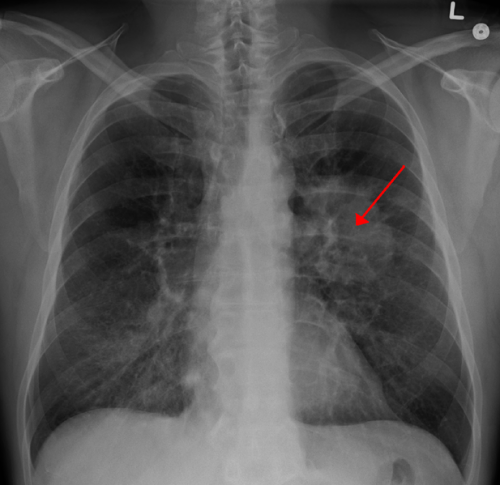Lung CA seen on CXR. Credit: CC BY-SA 4.0 James Heilman, MD/Wikipedia
Real-word evidence is suggesting, for the first time, the most beneficial treatment courses that could help extend the lives of patients with metastatic non-small cell lung cancer, according to research from the Abramson Cancer Center at the University of Pennsylvania.
In a new study published online today in JAMA Oncology, researchers show that patients harboring a KRAS gene mutation with high levels of PDL-1 lived longer when treated with immunotherapy alone, compared to patients without this mutation. This survival difference by KRAS status was not seen, however, in patients treated with both chemotherapy and immunotherapy, suggesting combination therapy for patients without the mutation may be preferred.
The new findings, based off an analysis of the Flatiron Health database of 280 cancer clinics nationwide with more than 1,100 patients, provide much-needed guidance to treat a disease that has a five-year survival of just 35 percent.
"This is a prime example of how real-world data can complement clinical trial data to help inform decision making between patients and their oncologists," said senior author Ronac Mamtani, MD, an assistant professor of Hematology-Oncology in the Perelman School of Medicine at the University of Pennsylvania.
Oncologists have several options to treat patients with metastatic non-small cell lung cancer and high levels of the immune biomarker known as PD-L1, including checkpoint inhibitors such as pembrolizumab or atezolizumab, which block different proteins, like PD-1 and PDL-1, that keep T cells from killing cancer cells. The therapy has changed the treatment landscape for many cancers, including lung, and is often paired with chemotherapies; however, which treatments or combination of treatments are best suited for patients with the KRAS mutation has been unclear.
"Many of the treatment decisions for these patients are imperfect and non-data driven, with no biomarkers to help guide them," said first author Lova Sun, MD, a fellow in the division of Hematology-Oncology in the Perelman School of Medicine.. "This study shows us an important piece of the molecular data, which is something the field hasn't had."
In the exploratory analysis of four years of clinical data, the researchers found that about half of the patients with PDL-1 levels higher than 50 percent tested positive for a KRAS mutation.
Patients with KRAS mutation and treated with a checkpoint inhibitor alone had superior survival compared to patients without the mutation: 21.1 vs 13.6 months. Among patients treated with chemo and immunotherapy, however, there was no significant survival difference between patients with or without the mutation. Also, patients without the mutation treated with just immunotherapy had worse survival than those treated with chemo and immunotherapy (13.6 vs 19.3 months), although the difference was not statistically significant.
These findings are applicable to a large subset of lung cancer patients, the researchers said.
"A third of patients with non-small cell lung cancer have high PD-L1, and of those patients, many have a mutation in KRAS," said co-senior author Charu Aggarwal, MD, MPH, the Leslye M. Heisler Associate Professor for Lung Cancer Excellence in Penn's Perelman School of Medicine. "There will be clinical implications for a large portion of patients with advanced lung cancer, as we learn more about this mutation and how other mutations may play a role in response."
Penn co-authors on the study Miles Tan, Roger B Cohen, and Corey J. Langer.
Journal information: JAMA Oncology























